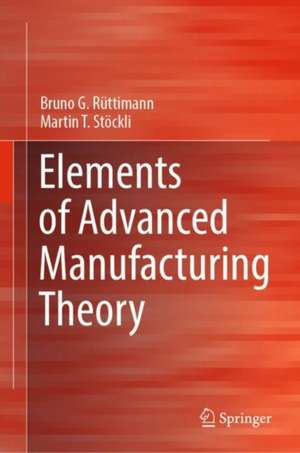Elements of Advanced Manufacturing Theory
Autor Bruno G. Rüttimann, Martin T. Stöcklien Limba Engleză Paperback – 19 iun 2023
| Toate formatele și edițiile | Preț | Express |
|---|---|---|
| Paperback (1) | 635.01 lei 6-8 săpt. | |
| Springer International Publishing – 19 iun 2023 | 635.01 lei 6-8 săpt. | |
| Hardback (1) | 641.20 lei 6-8 săpt. | |
| Springer International Publishing – 18 iun 2022 | 641.20 lei 6-8 săpt. |
Preț: 635.01 lei
Preț vechi: 747.06 lei
-15% Nou
Puncte Express: 953
Preț estimativ în valută:
121.53€ • 126.40$ • 100.33£
121.53€ • 126.40$ • 100.33£
Carte tipărită la comandă
Livrare economică 12-26 aprilie
Preluare comenzi: 021 569.72.76
Specificații
ISBN-13: 9783031020490
ISBN-10: 3031020499
Ilustrații: XV, 168 p. 49 illus., 45 illus. in color.
Dimensiuni: 155 x 235 mm
Greutate: 0.27 kg
Ediția:1st ed. 2022
Editura: Springer International Publishing
Colecția Springer
Locul publicării:Cham, Switzerland
ISBN-10: 3031020499
Ilustrații: XV, 168 p. 49 illus., 45 illus. in color.
Dimensiuni: 155 x 235 mm
Greutate: 0.27 kg
Ediția:1st ed. 2022
Editura: Springer International Publishing
Colecția Springer
Locul publicării:Cham, Switzerland
Cuprins
Foreword.- Prologue.- Acknowledgements.- 1. The Need for Manufacturing Theory- 2. Basic Classification of Production Systems.- 3. The Central Importance of the Bottleneck.- 4. Elasticity, Lead-Time, On-Time Delivery.- 5. Understanding the Advantage of Lean Pull JIT Versus Push B&Q.- 6. Flexibility and the One-off Product Challenge of CPPS.- 7. Some Critical Considerations About Industry 4.0.- Epilogue.
Notă biografică
B. Rüttimann:
- Dr.-Ing. Milan Polytechnic Institute
- MBA Bocconi University
- 20 years managerial experience (Alusuisse, Alcan, Rio Tinto)
- since 2010 consulting (inspire AG)
- since 2010 lecturing (ETH Zürich)
M. Stöckli
- Dr. sc. techn. ETH Zürich
- Dipl. Masch.-Ing. ETH Zürich
- NDS BWI, ETH Zürich - >20 years managerial experience in the automotive industry (Delphi Automotive Systems, IVECO, Schaffner, DUAP)
- since 2009 head of inspire Academy (inspire AG)
- since 2008 COO of inspire AG
- MBA Bocconi University
- 20 years managerial experience (Alusuisse, Alcan, Rio Tinto)
- since 2010 consulting (inspire AG)
- since 2010 lecturing (ETH Zürich)
M. Stöckli
- Dr. sc. techn. ETH Zürich
- Dipl. Masch.-Ing. ETH Zürich
- NDS BWI, ETH Zürich - >20 years managerial experience in the automotive industry (Delphi Automotive Systems, IVECO, Schaffner, DUAP)
- since 2009 head of inspire Academy (inspire AG)
- since 2008 COO of inspire AG
Textul de pe ultima copertă
This book is the continuation of the textbook Lean Compendium – Introduction to Modern Manufacturing Theory. It extends the theory of mathematical modeling to batch & queue-based cyber-physical production systems. To facilitate learning, the book continues to develop a Cartesian-derived understanding of the system’s behavior by applying manufacturing-specific theorems, corollaries and lemmas. A law-based description enables to model production mathematically and understand upfront their dynamics in terms of WIP generation, lead-times, exit-rates, and on-time delivery performance. While simulation alone only allows to explore the optimum solution, the development of a theory allows to gain knowledge. This improves the learning of the “physics” of manufacturing systems and contributes to a solid production’s understanding and a clear and cognitive problem determination that leads to a thorough mental capture for mastering a systematic design of such highly complex systems.
Caracteristici
It introduces a rational description of how manufacturing systems work and perform Explains theory with theorems, corollaries and lemmas Complements existing, rather discursive literature about Advanced Manufacturing
